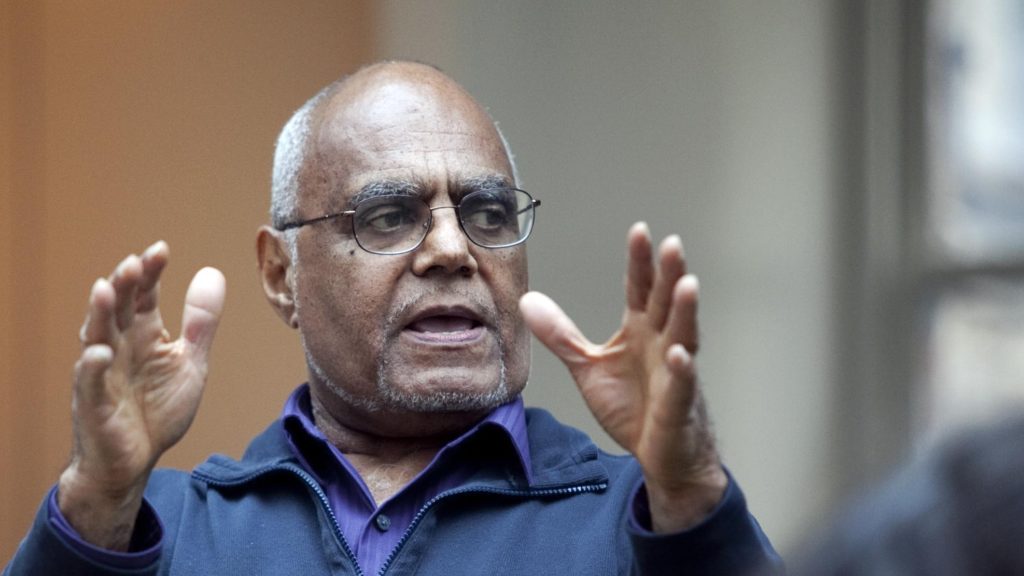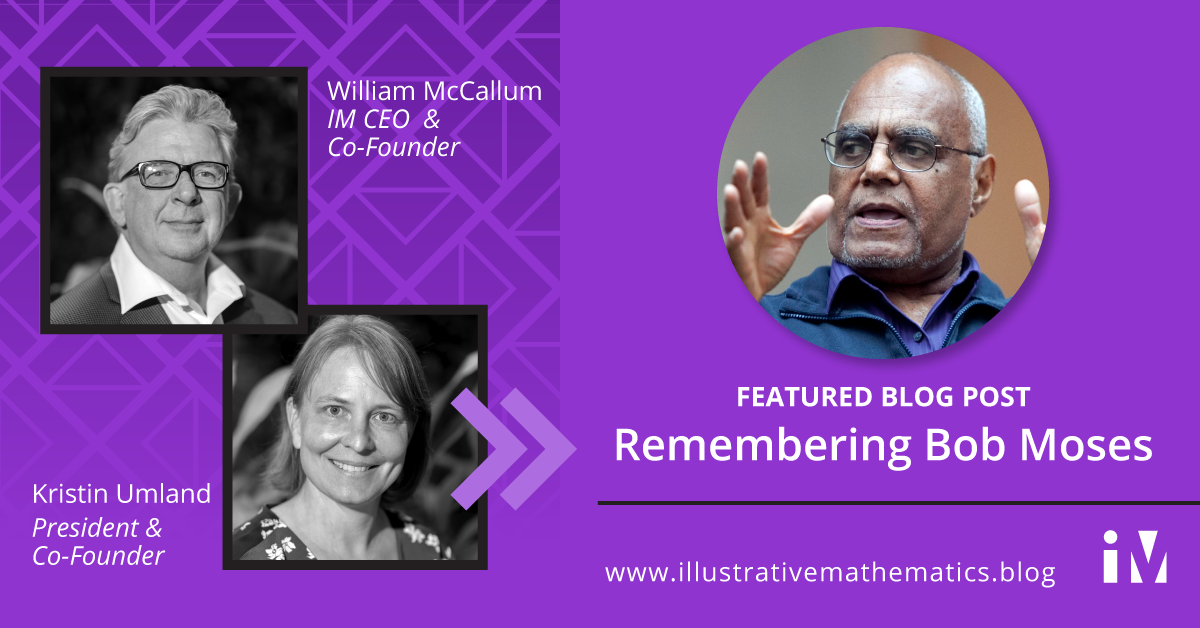By William McCallum and Kristin Umland
“Math literacy will be a liberation tool for people trying to get out of poverty and the best hope for people trying not to get left behind.”
—Bob Moses, 1935–2021

Photo Source: https://algebra.org/wp/bob-moses
Bob Moses, the civil rights leader and mathematics educator who died last July at the age of 86, started out his career as a mathematics teacher at Horace Mann School in the Bronx. Awoken by the sit-in movement, he went to Mississippi in the 1960s to organize for voter registration in communities of sharecroppers and day laborers. Then, in the 1980s, while pursuing a doctorate in Philosophy of Mathematics at Harvard University, he took up a new mission: he founded the Algebra Project to fight for the right to math literacy.
We both had a chance to see Bob Moses speak at mathematics education conferences in the 2000s. He was not a fiery speaker; he had a quiet, compelling manner and his talks were punctuated by silences that invited the listener to reflect on what they were doing for the cause of math literacy for all. We both found his ideas compelling and inspirational. To honor the influence he had on us and many other people, we interviewed a number of people who worked with him to learn more about his work. In this blog post, we hear from 3 of them whose careers were shaped by their encounters with Bob Moses. The interviews have been edited for clarity.
Bill Crombie is Director of Professional Learning at the Algebra Project, Inc. He was trained as a physicist and was teaching mathematics and computer science at UMass Boston when he first met Bob. One of its first initiatives of the Algebra Project was the development of a transition curriculum for middle school students to get them ready for algebra.
I started working with Bob in the spring of 1990 around curriculum development for the transition curriculum, on experientially developing a number line. That summer, Bob asked if I would like to go to a teacher training in San Francisco with him. Bob was doing the training. One exercise was called “make do” stories [stories about how you would make do if you didn’t have something]. It felt initially like an English Language Arts exercise. You wrote the stories and compared them, discussed the similarities and differences. And then it was like pulling a rabbit out of a hat; the features that make a make do story are very much the same features of equivalence. It was actually a discussion about mathematics that the middle school teachers were engaged in, about the difference between equality and equivalence. The thing that really struck me about the Algebra Project—and by that summer I realized I was doomed, I was going to be working for the Algebra Project—was that it felt very much like the way we do mathematics in physics. We had this concrete event that we shared and played with, and we ultimately tried to represent the important features of that event in a symbolic way.
Nell Cobb is a retired professor of mathematics education at DePaul University.
I go back probably around 30 years ago working with Bob. I was a high school math teacher, and there was a position that opened up for Executive Director of the Chicago Algebra Project program, which I took on. Bob and Bill Crombie would give the monthly workshops for teachers. I was in charge of program operations, trainer development, curriculum, and looking at the pedagogy they were using in the classroom. When I tried to go back into the classroom, DePaul reached out to me saying they had a position in the Department of Education. When I got there I realized that what I had been doing in the Algebra Project was something that I needed to do with preservice teachers. I’ll describe it in terms of Bob. The first time I took him into a Chicago Public School classroom, he would sit next to a student and talk to that student as if he had known that student for years, and he’d come out and we’d have what I felt was my first math ed course, because he would tell me the different ways the student was talking about the mathematics. He had me standing there, and I was thinking, “Where is this coming from?” Bob was just a natural connector of people and a natural educator. He connected with people and came out with anything he observed and any conversation he had. I needed to figure out how to be more like Bob, and that’s what I took into the academy.
Ben Moynihan is Executive Director of the Algebra Project, Inc.
I met Bob when I was 24, fresh out of college, having studied non-western music at Dartmouth. I had gone to the national conservatory in Dakar, Senegal to study West African Djembe drumming from Mali, Senegal, and Guinea, and a couple of weeks after I got back there was a civil rights conference at Dartmouth, where Bob was speaking. I introduced myself to him afterwards and we stayed in touch. Two years later he was interested in developing some experientially based curriculum materials which later became the African Drums and Ratios curriculum, a set of materials based on drum-making and polyrhythmic drumming activities. The drum introduced geometry concepts and non-standard measurement concepts for grades 3–5, and then a pulse and beating number module introduced least common multiples and equivalent ratios through actual drumming activities. We found that some students found this was valuable and provided them with a way into the math content that they hadn’t previously had. And that’s what got me into the Algebra Project. In connecting with Bob and the work of the Algebra Project, there was a resonance with a set of values I had been brought up with around civil rights and people in multiracial collaborations struggling together for the civil rights of all. As it happens, mathematics is the key lever that Bob identified. Math literacy, like voting rights in Mississippi in the 60s, is one of those fundamental rights that require a collective struggle to keep chipping away at.
One of Bob Moses’ last pieces of writing was published posthumously in August of this year, entitled Returning to ‘Normal’ in Education is Not Good Enough. He points out that normal was never very good for a lot of students: “Just like the right to vote in the 20th century, the lack of equal access to a quality education in the 21st century threatens to limit the future life choices for too many young people.”
Next Steps
At Illustrative Mathematics we are committed to racial justice through ensuring the right of every learner to engage in meaningful, rigorous, grade-level mathematics. You can learn more about those efforts from this blog post and at our upcoming webinar on November 10 entitled “Racial Justice in Mathematics Education.“
